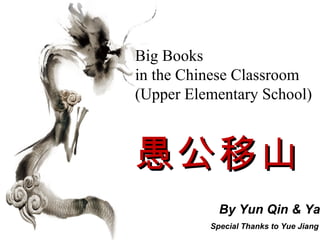Big book by Yana and Yun
- 1. Big Books in the Chinese Classroom (Upper Elementary School) 愚公移山 By Yun Qin & Ya Special Thanks to Yue Jiang
- 2. ?
- 3. ? ?
- 4. ? ?
- 5. ? ?
- 6. ? ?
- 7. Simplified version for young kids ? 1. 很久很久以前,有一个老人叫愚公,他已经九十 多岁了。 ? 2. 他家门口有两座大山,出门很不方便。 ? 3. 所以他想把山搬走。他开始一点一点地搬这两座 山。 ? 4. 他有一个邻居叫智叟。智叟笑话他说:“你真笨 啊,这么大的山,什么时候才能把它搬走呢?” ? 5. 愚公笑笑说:“我搬不走还有我的儿子接着搬;我 的儿子搬不走还有我的孙子接着搬。总有一天会把 山搬走的。” ? 6. 天上的神仙听到愚公的话以后很感动,就帮他把 这两座山搬走了。
- 8. Big Book Lesson Plan ???????????????????????????????????by Yana Yu Grade: ? Fourth?Grade Proficiency:? ? Students?have?had?3?years?Chinese.?? Students?are?familiar?with?pinyin?and? have?learned?many?daily-use? characters.? New Characters :? ? 座 (zuò) ;方便 (fāngbiàn) ;搬 (bān) ; 搬走 (bānzǒu) ;接着 (jiēzhe) Grammar Structure: ? "Ba"?structure?
- 10. ? 愚公移山( 1 ) Objective: SWBAT?make?predictions?from?the?name?of?the?story. Do Now: [Teacher?shows?a?mountain?picture.]? ? Think-Pair-Share ? ?Think:? 想一想,如果你家门口有座山,挡住了去路,你会怎么办? (If?there?was?a?mountain?in?front?of?your?house,?which?blocked?your?way,? what?would?you?do?)? ? ?Pair:?? 把你的答案告诉你的朋友。 (Turn?to?your?friend?and?share?your?answer?with?him?or?her.) ? ?Share:? 几分钟后老师要请你说说你朋友的答案。 (Tell?teacher?your?friend's?answer.)?
- 11. Teaching: ? 1.?Teacher?shows?the?cover?of?the?big?book. ? T :请看封面。 (Let’s?look?at?the?cover.)? 标题是 (The?title?is) 《愚公移山 Yú?Gōng?Yí?Shān 》讲的是一个叫愚公的老人搬走一座山的故事。 (The? story?is?about?an?old?man?named?Yu?Gong?moving?mountains.) Ask?Ss?(in?Chinese)?to?make?predictions?about?the?story. T :猜一猜, (9)这个叫愚公的老人为什么要搬走山呢? (Why?did?Yu?Gong?have?to? move?the?mountains??) (10)他是怎么把山搬走的? (How?did?he?move?the?mountains??) (11)他最后有没有把山搬走? (Did?he?finally?move?the?mountains?)?? ? 看了这个标题后,你还有什么想要问的问题吗? Ss?are?welcomed?to?ask?any?questions?about?the?title?of?the?book.?
- 12. 2.?Students?learn?new?vocabulary. 座? (zuò) : Measure?Word?for?mountain.???? 一座山: a?mountain 方便? (fāngbiàn) : convenient;?easy Ex.? 在纽约,出门很方便。 (Getting?around?is?rather?convenient?in?New?York.)? 搬? (bān) : move?from?one?place?to?another???? 搬 = 移 搬家: move?house 搬走? (bānzǒu):?move?out;?move?away Ex.? 他已经搬走了。 (He?has?moved?out.) ?????? 《谁搬走了我的奶酪?》 (Who Moved My Cheese?) 接着? (jiēzhe):?follow;?continue Ex.? 我讲完了你接着讲。 (I’ll?speak?first?and?then?you?follow.) ?????? 黑夜接着白天。 (Night?follows?day.) Teacher?teaches?words?by?using?PPT?and?dramatic?body?language.
- 13. ? 愚公移山( 2 ) Objective: SWBAT?to?get?the?picture?of?the?beginning,?middle,?and?end?of? the?story. Do Now:?Find?your?seat?and?sit?in?groups. ? Teaching: 6.Teacher?reads?and?explains?the?story.? Activity:?Numbered?Heads?Together ?(1)?Students?number?off?within?each?group.?? ?(2)?Teacher?asks?questions: a.? 愚公遇到了一个什么麻烦? b.? 愚公想到了一个什么办法? c.? 最后他做到了吗?怎么做到的? ??????(3)?Students?in?each?group?“put?their?heads?together”?to?decide?on?an? answer.?All?students?are?responsible?for?knowing?the?answer. ?(4)?Teacher?chooses?a?number?at?random.?Students?with?that?number?raise? their?hands?and?answer?questions.
- 14. 2.?Teacher?instructs?the?"Ba"?structure. (3)神仙搬走了这座山。 = 》神仙把这座山搬走了。 (2)? 愚公想搬走这座山。 = 》愚公想把这座山搬走。 (3)? 愚公没有搬走这座山。 = 》愚公没有把这座山搬走。 使用“把”字句是为了强调宾语,注意动词后面是动作的结果。 ( The?reason?why?using?"Ba"?structure?is?to?emphasize?the? object. ) ( Pay?attention?that?the?verb?needs?to?show?the?result?caused?by? the?action. ) Exercise:?[on?the?worksheet] Complete?the?story?by?using?"Ba"?structure?in?a?proper?way.
- 15. ? 愚公移山( 3 ) Objective: SWBAT?know?how?to?use?"Ba"?structure. Do Now: ?TPR Ss?respond?to?teacher’s?commands?that?require?physical?movement. T:???? 把窗打开。 把脚抬起来。 把椅子搬走。 请走到门口,把灯关上。 请把书包打开,把作业拿出来,把作业教给老师。 Teaching:?Review?and?continue?to?instruct?other?usage?of?"Ba"? structure.
- 16. Teacher?gives?examples?by?demonstrating?how?to?use?the?“ba”?structure? to?state?an?action. ( 1 )? Teacher?puts?a?book?on?the?desk. 老师把书放在桌子上。 ( 2 )? Teacher?gives?a?student?a?book. 老师把书给 Peter 。 Activity: 8)Ask?each?student?to?"ba”?one?thing?"fang?zai”?somewhere?or?"ba"?one? thing?"gei"?someone?else.? ??????This?is?done?in?sequence,?in?other?words,?every?student?will?be?a? chance?to?"ba"?something?and?"do?something"?with?it.?? Ex.? 把一支笔放在他的书包里。 / 把桌上的纸交给 Peter 。 2)???Ask?them?what?they?notice?about?the?sentence,?and?write?it?on?the? board?IN?CHINESE.?? 3)???Give?them?some?items?to?"ba"?and?"do?something?with",?and?practice? aloud?with?them?as?a?group.?
- 17. 4)?Put?them?in?pairs.? ( 1 )? Student?One?has?a?picture?of?a?classroom?with?classroom? items?in?certain?places?(paper?on?desk,?textbook?on?bookshelf,?chalk?on? blackboard,?etc.)?? ( 2 )? Student?two?has?a?picture?of?a?classroom?and?cut-outs?of?the? classroom?items.? ( 3 )? Student?one?instructs?student?two?where?to?place?the?items,? using?the?"Ba"?structure. (4)??Students?check?each?others?work?to?see?if?they?got?it?right. 5)?Game:?King?and?soldier (1)?Each?students?writes?down?three?orders.?They?must?use?"Ba"? structure?at?least?once. (2)?Students?draw?lots?to?decide?who?is?the?king?and?who?is?the?soldier.? (3)?The?soldier?should?follow?the?king’s?orders.
- 18. ? 愚公移山( 4 ) Objective:?SWBAT?know?details?of?the?story. Do Now:?Read?Aloud?the?story? ? Activity: Interview?Yu?Gong ? T:? 现在我想请一个小朋友做愚公,其他小朋友可以问他问题。 ?(Ask?one?student?to?be?Yu?Gong,?and?the?rest?of?Ss?will?interview?him?and? ask?him?whatever?you?want.)? 比如说,“你是谁?” “你住在哪里?” ?(For?example,?“Who?are?you?”?“Where?do?you?live?”? ?Ss?can?use:?how,?why,?when,?where,?etc.) ? Teaching: T:? 在这个故事中,有一个人也有问题要问愚公。 ?(In?the?story,?a?man?also?had?a?question?to?ask?Yu?Gong.)? 他是谁?他问了什么问题? ?(Who?was?he??And?what?did?he?ask?) 愚公怎么回答他? ?(How?did?Yu?Gong?answer?his?question?)
- 20. Th an k Y ou! 谢谢!
Editor's Notes
- Merry Christmas!










![? 愚公移山( 1 )
Objective: SWBAT?make?predictions?from?the?name?of?the?story.
Do Now:
[Teacher?shows?a?mountain?picture.]?
?
Think-Pair-Share
?
?Think:? 想一想,如果你家门口有座山,挡住了去路,你会怎么办?
(If?there?was?a?mountain?in?front?of?your?house,?which?blocked?your?way,?
what?would?you?do?)?
?
?Pair:?? 把你的答案告诉你的朋友。
(Turn?to?your?friend?and?share?your?answer?with?him?or?her.)
?
?Share:? 几分钟后老师要请你说说你朋友的答案。
(Tell?teacher?your?friend's?answer.)?](https://image.slidesharecdn.com/bigbookyana-1-120404124248-phpapp02/85/Big-book-by-Yana-and-Yun-10-320.jpg)



![2.?Teacher?instructs?the?"Ba"?structure.
(3)神仙搬走了这座山。 = 》神仙把这座山搬走了。
(2)? 愚公想搬走这座山。 = 》愚公想把这座山搬走。
(3)? 愚公没有搬走这座山。 = 》愚公没有把这座山搬走。
使用“把”字句是为了强调宾语,注意动词后面是动作的结果。
( The?reason?why?using?"Ba"?structure?is?to?emphasize?the?
object. )
( Pay?attention?that?the?verb?needs?to?show?the?result?caused?by?
the?action. )
Exercise:?[on?the?worksheet]
Complete?the?story?by?using?"Ba"?structure?in?a?proper?way.](https://image.slidesharecdn.com/bigbookyana-1-120404124248-phpapp02/85/Big-book-by-Yana-and-Yun-14-320.jpg)





